-- Since its founding in 1921, the Communist Party of China (CPC) has attracted many foreign friends, including Edgar Snow and Hans Muller, during different periods of revolution, construction and reform.
-- The CPC has led the Chinese people to bid farewell to a humiliating history of being arbitrarily exploited by foreign powers, and transform China from an impoverished country into the world's second-largest economy.
-- The CPC has arguably been the world's most successful political party over the last century, according to British political scholar Martin Jacques.
-- The judgment of a political party ultimately depends on tangible results. Under the leadership of the CPC, Chinese citizens' quality of life is improving generation by generation.
-- While leading the people toward the great rejuvenation of the Chinese nation, the CPC is also writing a new chapter on the joint construction of a community with a shared future for humanity.
by Xinhua writers Wang Jinye, Li Laifang, Lou Chen and Yao Yuan
BEIJING, June 19 (Xinhua) -- "Never leave China," Dr. Hans Muller repeatedly told his wife before he passed away in 1994.
In 1939, World War II broke out. Muller, a young German with a medical degree from Switzerland, arrived in Yan'an in northwest China and fought side by side with the Communist Party of China (CPC) and the Chinese people in the War of Resistance Against Japanese Aggression, and later in the War of Liberation. He devoted himself to China's socialist construction after the founding of the New China in 1949.
Since its founding in 1921, the CPC has attracted many foreign friends like Muller during different periods of revolution, construction and reform. Their interactions with Chinese Communists over the past century have opened a window through which the world can better understand the CPC.
Today, the CPC is the world's largest political party with more than 90 million members. The CPC has over the past century led the Chinese people to achieve national independence, bid farewell to a humiliating history of being arbitrarily exploited by foreign powers, and transform China from an impoverished country into the world's second-largest economy, which enjoys all-round moderate prosperity.
The CPC, which is about to celebrate its centenary, is leading the world's most populous country toward the goal of great rejuvenation of the Chinese nation.

A bullet train passes by the fields dotted with blossoming plants in Luoxiang Township of Congjiang County, southwest China's Guizhou Province, Feb. 23, 2021. (Xinhua/Yang Wenbin)
INVINCIBLE, INCREDIBLE STRENGTH
What are the Chinese Communists like?
In 1936, American journalist Edgar Snow journeyed to the northern areas of northwest China's Shaanxi in search of the answer to this question.
In a cave dwelling, Mao Zedong and Snow had many long talks. In a period of approximately four months, Snow also interviewed Peng Dehuai, Xu Haidong and other senior CPC officials and ordinary soldiers, and experienced life in the Red Army.
In his book "Red Star Over China," Snow mentioned the tenacity with which the Chinese Communists clung to their principles, as well as the invincible, incredible soldiers led by the CPC and the indestructible energy behind them.
George Hatem, a U.S. doctor known in China by his Chinese name Ma Haide, visited northern Shaanxi together with Snow. Moved by the bravery of the Red Army, he decided to stay at the end of his tour. He joined the CPC in 1937 and became the first Westerner to gain CPC membership.
In order to make a contribution, one must have strong spiritual support, Ma Haide said in his late years.
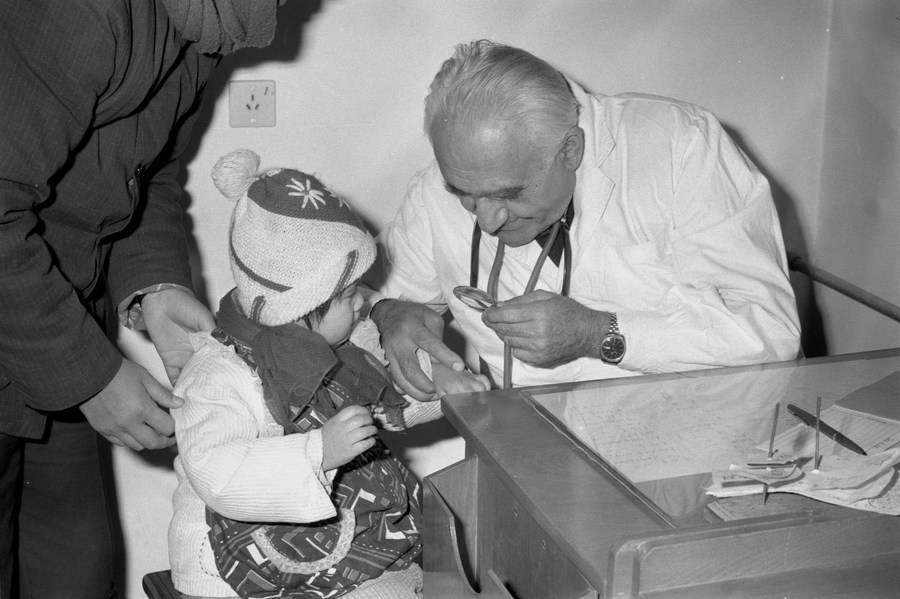
Undated file photo shows George Hatem, a U.S. doctor known in China by his Chinese name Ma Haide. (Xinhua)
Over the past 100 years, the CPC has stayed true to its founding aspiration and mission, leading the Chinese nation in a tremendous transformation: It has stood up, become better off and grown in strength. The nation has achieved two feats rarely seen around the world: rapid economic growth and long-term social stability.
The CPC has arguably been the world's most successful political party over the last century, according to British political scholar Martin Jacques.
Corentin Delcroix, a French chef and entrepreneur who has been living in China for 15 years, runs a company in Shanghai.
Delcroix said he thought the Western stereotype of communism has stagnated since the Cold War. "A lot of people think communism itself is just scary, without understanding it at all," he said.
The judgment of a political party ultimately depends on tangible results. Under the leadership of the CPC, Chinese citizens' quality of life is improving generation by generation, Delcroix observed.

In this combo photo, the left part taken on May 10, 2019 with a drone shows children walking on their way home after school in Nongyong Village, and the right part taken on Sept. 3, 2012 shows children stepping down the hanging ladders to school in Nongyong Village, south China's Guangxi Zhuang Autonomous Region. (Xinhua/Huang Xiaobang)
"The Communist Party of China makes every effort to think and act for the future of the country," said Shunsuke Nakajima, a Japanese national who has been promoting bilateral exchanges for years and has visited China many times.
Hans Muller joined the CPC in 1957, and made an important contribution to the country's hepatitis prevention efforts. Speaking of her late husband, Kyoko Nakamura, who joined the CPC-led army after Japan's surrender in 1945, said that after so many years in China, Muller felt China was a promising country.
Israel Epstein visited Yan'an in 1944 as a reporter for U.S. media. He interviewed Mao Zedong, Zhou Enlai, Zhu De and other CPC leaders. Epstein believed he shared a similar -- or even the same -- world outlook with the CPC, and was convinced that Yan'an represented China's future. He gained Chinese nationality in 1957 and joined the CPC in 1964.
"He supports China because the Communist Party of China is right," said Epstein's widow Huang Huanbi. "What he appreciated most was that the Communist Party is for the poor and helps the people."
ALWAYS CARING FOR AND SERVING THE PEOPLE
In "Red Star Over China," Snow detailed how and why the CPC had won strong support and trust from farmers, indicating the close bonds between the CPC and the people.
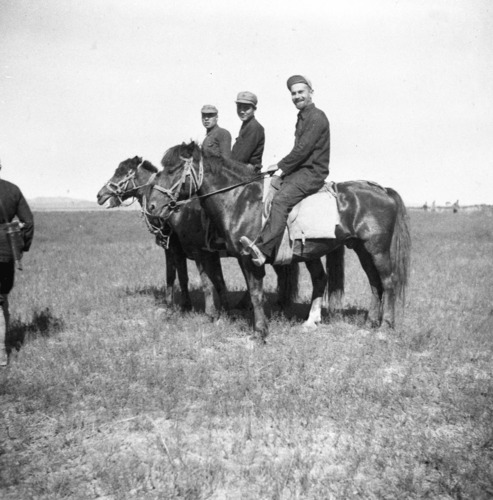
Undated file photo taken in 1936 shows American journalist Edgar Snow (1st R) on his journey for interviews in the northern areas of Shaanxi Province in northwest China. (Xinhua)
In an article for U.S. media, Epstein wrote that the Eighth Route Army, which was led by the CPC, maintained close ties with the people and never took a needle or a thread from the masses.
The CPC considers serving the people wholeheartedly to be its purpose. The Party is required to share weal and woe with the people, maintain close ties with them, and safeguard the fundamental interests of the people.
Snow once described northern Shaanxi as one of the poorest places in China. Now, it has shaken off absolute poverty along with other impoverished areas thanks to the CPC's targeted poverty reduction policy. China has lifted over 700 million people out of poverty since reform and opening-up began in the late 1970s.
David Osborn, an Australian sheep breeding expert, has been participating in China's anti-poverty drive. Over the past few years, he has visited Huanxian County in northwest China's Gansu Province several times to promote breeding technologies that can help raise the incomes of villagers, many of whom were in poverty for generations.
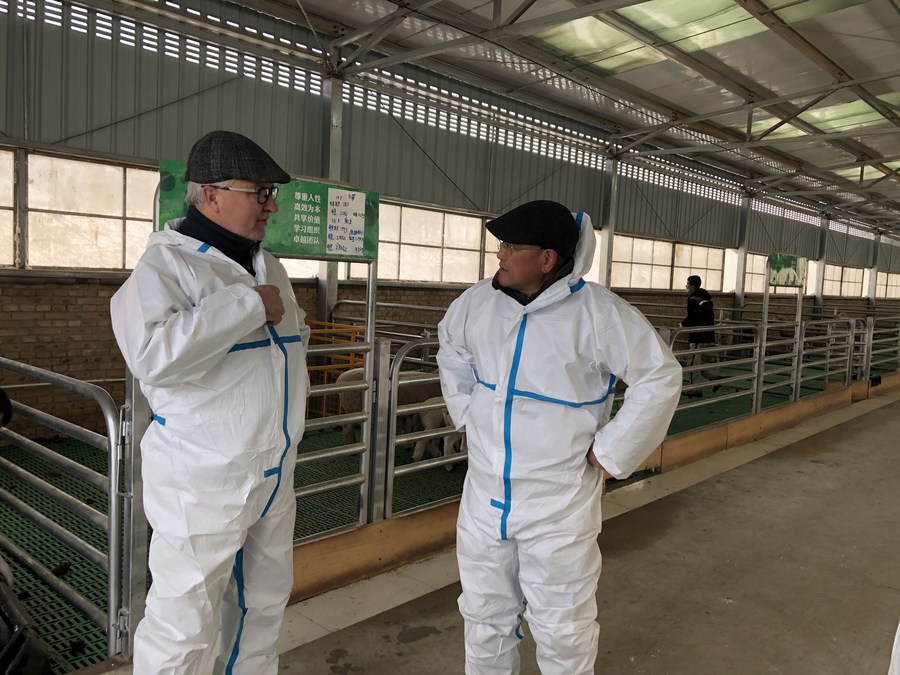
Australian animal husbandry expert David Osborn (L) talks with Li Guozhi, head of an animal breeding company, at a sheep pen in Huanxian County, northwest China's Gansu Province, Dec. 3, 2020. (Xinhua/Zhang Wenjing)
"The thought that the CPC has lifted hundreds of millions of people out of poverty is just extraordinary. It is one of the world's great achievements," he said, praising CPC members' readiness to help and the Party's strong executive capability.
By the end of 2020, all remaining poverty-stricken counties had shaken off that label.
"The Communist Party of China leads the people, and its members are at the forefront. Nothing is impossible," said Hans Muller's son, Dehua Muller, in Beijing.
Yahia Mustafa from Sudan contributed to the Arabic translation of Xi Jinping's report to the 19th CPC National Congress in 2017, and noted that the key concepts in the report -- from "a moderately prosperous society" to "a community with a shared future for humanity" -- were all about putting public interests above all else.
"The distinctive feature of the CPC is that it puts people first and always cares for and serves the people," said Mustafa, who has lived in China for over 20 years.
The people-oriented philosophy of the CPC is also evidenced by the nationwide mobilization to contain the raging COVID-19 epidemic in 2020. The CPC asked its members to take the lead by assuming the most arduous and dangerous jobs in the battle against the virus.
Jean Christian Nzengue from Gabon last year joined a team screening fever patients and offering consultations in a community in the southern city of Guangzhou, working closely with many CPC members.
"It was dangerous, but the CPC members did not complain because they love their country and want to protect its people," said the cardiac specialist.

Gabonese doctor Jean Christian Nzengue (R) is seen with a Chinese colleague, who is also a member of the Communist Party of China (CPC), in Guangzhou, south China's Guangdong Province, Jan. 18, 2021. (Xinhua/Hong Zehua)
According to a white paper issued in June last year, more than 39 million CPC members and cadres fought against COVID-19 on the frontline, and nearly 400 died in the process.
"China's anti-epidemic fight has clearly demonstrated the solidarity and trust between the people, the Party and the government to a level rarely seen in other parts of the world," said Mustafa.
The Party's dedication to the people has boosted public support for the government. A report from Harvard University, based on its 13-year survey in China, showed that the Chinese people's overall satisfaction with the central government exceeded 93 percent.
CONSULTING THE PEOPLE
Epstein and Ma Haide later became members of the National Committee of the Chinese People's Political Consultative Conference, the country's top political advisory body, participating in the practice of socialist democracy. They made proposals on health, education and other fields. In 2015, China for the first time solicited opinions from foreign experts during the drafting of the annual government work report.
Mustafa, who had worked at the Sudan News Agency for about 10 years, now has an independent understanding of China and the CPC after working and living in China.
"In the West, the goal of political parties is to gain political power and serve their own interests. For the Communist Party of China, power is a means to serve the people, and all development strategies and plans are centered on serving the people," he said.
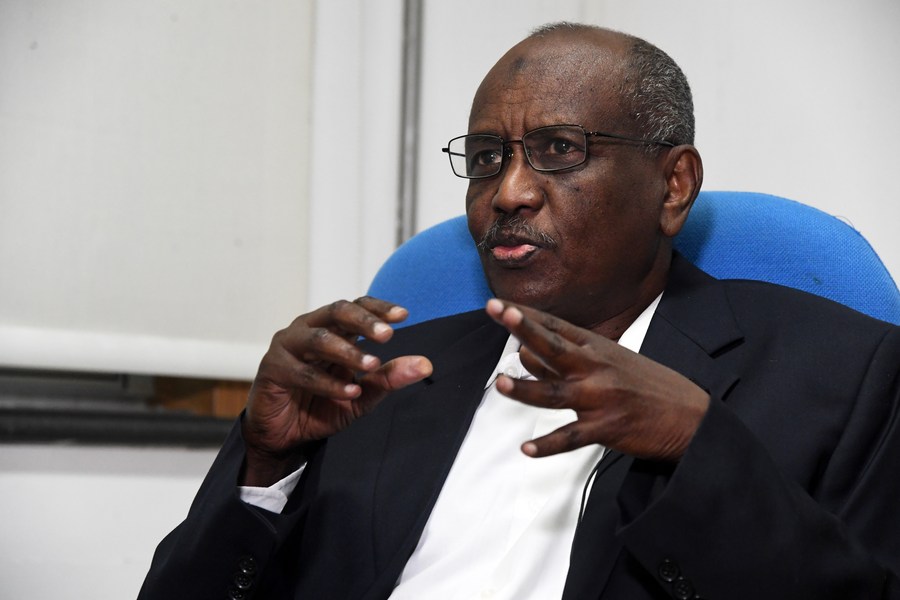
Yahia Mustafa speaks in an interview with Xinhua in Beijing, capital of China, Jan. 19, 2021. (Xinhua/Ren Chao)
Isabel Crook, a Canadian national, and her British husband David Crook, studied CPC-led land reform in 1947. They later trained a large number of foreign-language speakers for China.
In 2019, the Chinese government awarded Isabel Crook and five other foreign nationals the Friendship Medal for their great contributions to supporting China's socialist modernization, promoting exchanges and cooperation between China and foreign countries, and safeguarding world peace.
What they felt most deeply was that the CPC was good at mobilizing ordinary people, accepting supervision from the masses, and discussing with them, said Michael Crook, son of Isabel Crook and chairman of the International Committee for the Promotion of Chinese Industrial Cooperatives.
The CPC has pioneered a socialist political system with Chinese characteristics and continued to improve it to ensure that the people partake in democratic elections, consultations, decision-making, management, and oversight in accordance with the law.
Laurence J. Brahm, a senior international fellow at the Center for China and Globalization, said that Chinese democracy, which is different from that in the West, is a system of consensus-building.
PATH OF COOPERATION
Over the past 100 years, the Communist Party of China has worked arduously for the well-being of the Chinese people and the rejuvenation of the Chinese nation. In today's world, China's solutions are an important contribution to improving global governance.
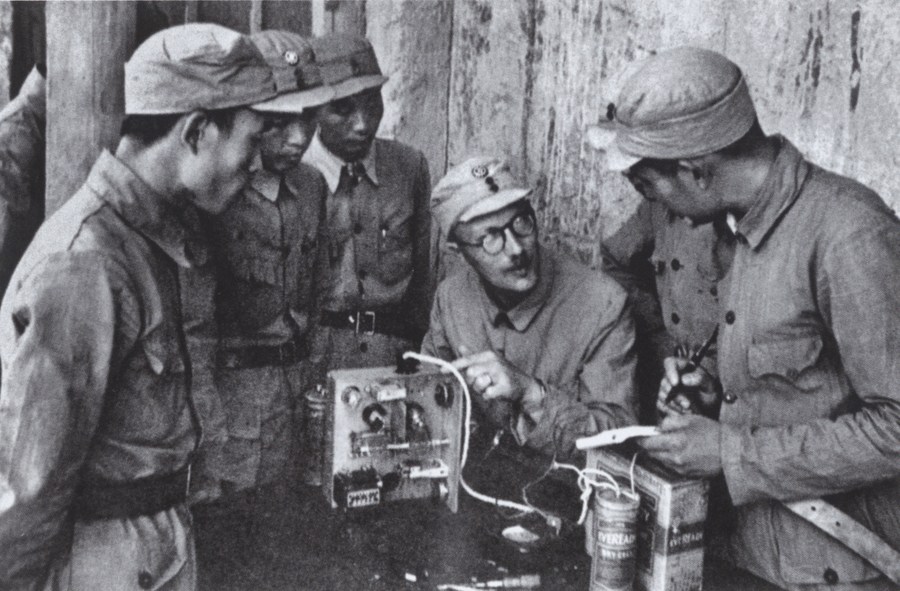
Undated file photo shows Michael Lindsay teaching radio skills during a training course to the Chinese army. (Xinhua)
Michael Lindsay, a British national, aided the CPC in the War of Resistance against Japanese Aggression by upgrading radio equipment and building radio stations for the Chinese army in the 1930s and 1940s.
In 1944, he helped with the launch of an English broadcasting service for the Xinhua News Agency in Yan'an, allowing news of the CPC to be heard across the Pacific.
Today, the voices and visions of the CPC are more widely transmitted across the globe, and have won more positive responses and support.
China plays an important role in world affairs. Other big countries must cooperate with China to solve global problems such as climate change, biodiversity conservation and pandemics, according to Jim Lindsay, son of Michael Lindsay.
The COVID-19 pandemic has claimed more than 3.8 million lives worldwide. While making strategic achievements in its own COVID-19 prevention and control, China has been actively providing aid to other countries. It has exported large quantities of medical supplies and helped other countries fight the pandemic. Its COVID-19 vaccines have become global public goods.

File photo shows experts of the Chinese medical team and local medical staff posing for a photo amid the COVID-19 pandemic in Brazzaville, capital of the Republic of the Congo, May 26, 2020. (Xinhua)
Such efforts fit into the CPC's vision of "a community with a shared future for humanity," which has gained wider recognition and support in the global fight against the COVID-19 pandemic.
A total of 138 countries and 31 international organizations have signed cooperation agreements with China on the Belt and Road Initiative (BRI), which aims to achieve policy, infrastructure, trade, financial and people-to-people connectivity along and beyond the ancient Silk Road trade routes. The BRI has become the world's largest international cooperation platform and a vital public product.
David Ferguson, a British national, came to China in 2006. He is now a senior English editor with the China Foreign Languages Publishing Administration and participated in the English editing of "Xi Jinping: The Governance of China" and several government white papers.
After translating a compilation of President Xi Jinping's discourses on the BRI, Ferguson said he believes the initiative has provided a major channel for the world to strive for globalization, peace and stability, prosperity and development.
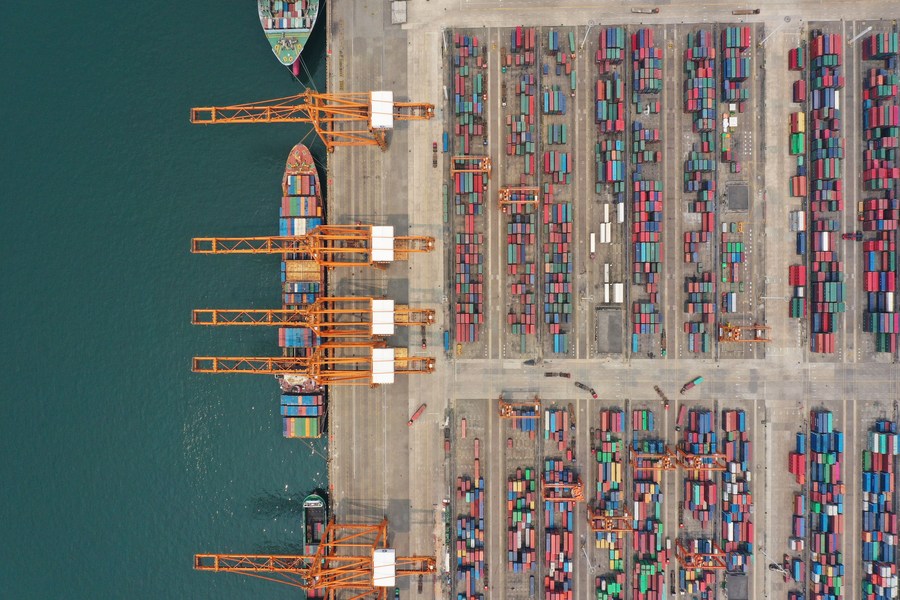
Aerial photo taken on April 13, 2019 shows a container wharf at Qinzhou port in south China's Guangxi Zhuang Autonomous Region. (Xinhua/Cao Yiming)
Mustafa noted that "a community with a shared future for humanity" is also rooted in traditional Chinese culture, which stresses the need for humanity to share weal and woe. China not only pursues its own development but also deeply integrates itself into the international community and shares its gains with others, he said.
In 2019, the movie "Red Star Over China" was screened in China. And Snow's books remain popular in China and worldwide.
China has come a long way from Snow's depiction in the 1937 book. While leading the people toward the great rejuvenation of the Chinese nation, the CPC is also writing a new chapter on the joint construction of a community with a shared future for humanity.
(Xuan Liqi, Cao Yi, Zhao Xu, Zhang Wenjing, Hong Zehua, Miao Xiaojuan, Bai Xu, Song Rui and intern Fang Anran contributed to the story; Video reporter: Yang Dingdu, Sui Lixi, Yang Chi, Huang Yaoteng, Bai Yu, Yu Li, Wang Siban; Video editor: Chen Zhi, Li Zhengyu, Xu Haijing )■




